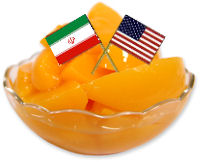
ABOVE: Orionair BAe 146-300
Back in May, the Bureau of Industry and Security (“BIS”) issued a Temporary Denial Order against Spanish airline Orionair in connection with a pending export of two aircraft owned by Orionair to Syrian airline Syrian Pearl. An article that appeared on June 26 in Madrid-based Spanish-language daily CincoDÃas provides some interesting background surrounding the TDO and its effects. (Yes, I know that the article is almost two weeks old, but it’s harder to find things in the foreign language press. And none of this has yet been reported in the U.S. press.)
According to the article, Orionair had bought two BAe 146-300 aircraft to add to its one-aircraft fleet. The company basically chartered its aircraft for sporting events. After the increase in the cost of fuel, the company began to face financial difficulties and sought to alleviate them by entering into a wet-lease agreement with Syrian Pearl. Under a wet lease agreement, the leasing company (here, Orionair) provides the aircraft, flight crew, maintenance and insurance and the lessee (in this case, Syrian Pearl) pays for fuel, airport fees and the like as well as for an hourly fee for the operation of the aircraft. The aircraft subject to a wet lease is flown under the lessee’s flight numbers and the craft is painted with the lessee’s insignia. In return, Syrian Pearl agreed to guarantee 6,000 hours for the two aircraft as well as to pay the fees for the re-fitting of the aircraft.
The premiere flight under the Agreement took place on May 4 between Damascus and Aleppo. But only two days before, two U.S government officials, presumably from BIS, were in Orion’s offices in Madrid advising the company that its arrangement with Syrian Pearl required permission from Washington, D.C. because the aircraft had more than 10 percent U.S. origin parts and components. The Orion officials were unimpressed, noting that the BAe aircraft were made in England, that the aircraft were being leased and not sold, and that Spain was friends with Syria. Orion also consulted with the Spanish government officials who seemed to doubt that the U.S. would force the issue. Wrong.
BIS apparently went straight to BAe and informed the company that it would be issuing a Temporary Denial Order against Orionair. As a result, BAe immediately told Orionair, even before the TDO was signed or published, that it was not continuing the modifications of the aircraft and that, moreover, the aircraft would have to remain in the United Kingdom. When the TDO was published on May 7, Orionair attempted to invoke its force majeure clause with Syrian Pearl to excuse its anticipated inability to perform any further under the wet lease. Syria was not, so to speak, amused and seized the other of the two aircraft, which was in Syria at the time. The Syrians also detained, for good measure, Orionair flight crews and employees in Damascus, although they have just recently been allowed to return to Spain.
Orionair now doesn’t have either of the two BAe aircraft, is facing a lawsuit from Syrian Pearl for breach of contract, and will probably soon be receiving charging letters from BIS seeking fines and, probably, worse. Syria’s embassy in Madrid is not commenting, characterizing the dispute as “private.”
I can’t imagine that the Spanish Government is happy about all this. Just to understand the reason why the Spanish might be annoyed, suppose that the Spanish government covertly sent over two government law enforcement officials to advise a U.S. company on U.S. soil that it couldn’t complete a transaction with Mexico without the permission of the Spanish government. Imagine further that when the U.S. company declined to obtain such permission, the Spanish government encouraged a company in the U.K. to detain the property of the U.S. company that it had been servicing under contract. Do you think that the U.S. government would sit idly by and do nothing? I don’t. We would be squawking about sovereign rights, territorial inviolability, secondary boycotts, WTO obligations, extraterritorial application of Spanish law and would be threatening some kind of retaliation, including burning copies of Don Quixote in mass bonfires, pouring Rioja down the gutter, and renaming Paella as “Freedom Chicken and Rice.”

 Posted by
Posted by  Category:
Category: 

 Last week, the United States Court of Appeals for the D.C. Circuit issued its
Last week, the United States Court of Appeals for the D.C. Circuit issued its  . . . to the tune of $6,600. In the civil penalties information
. . . to the tune of $6,600. In the civil penalties information 

